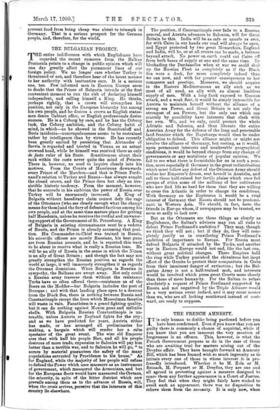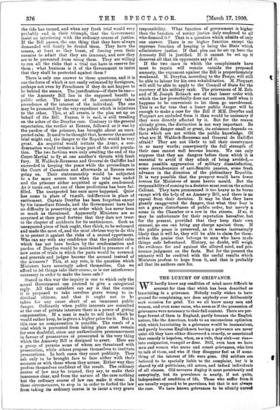THE FRENCH AMNESTY.
IT is only human to dislike being pardoned before you have been condemned. Even if you know that you are guilty there is commonly a chance of acquittal, while if you know that you are innocent the very mention of forgiveness is an offence. This, however, is what the French Government propose to do in the case of those who are awaiting trial for matters arising out of the Dreyfus affair. They have brought forward an Amnesty Bill, which has been framed with so much ingenuity as to irritate every one of those in whose interest it is pro- fessedly introduced. Whether it be M. Zola or M. Reinach, M. Picquart or M. Dreyfus, they are one and all agreed in protesting against a measure designed to spare them any further appearances in a Court of Justice. They feel that when they might fairly have wished to avoid such an appearance, there was no disposition to relieve them from the necessity. It is only now, when the tide has turned, and when any fresh trial would very probably end in their triumph, that the Government insist on interfering with the ordinary course of justice. If the Bill passes, the one thing that they have always demanded will finally be denied them. They have the means, at least so they boast, of forcing even their enemies to admit that they are innocent, and now they are to be prevented from using them. They are willing to run all the risks that a trial can have in reserve for them ; what business is it of the Government to insist that they shall be protected against them ?
There is only one answer to these questions, and it is one the force of which is not easily estimated by foreigners, perhaps not even by Frenchmen if they do not happen to be behind the scenes. The justification—if there be one— of the Amnesty Bill lies in the supposed benefit to public order. The interest of the community takes precedence of the interest of the individuaL The one may be promoted by the very expedient which is injurious to the other. This, at all events, is the plea set up on behalf of the Bill. France, it is said, is still treading on the ashes of the Dreyfus case. Contrary to the general expectation, the verdict at Rennes, followed as it was by the pardon of the prisoner, has brought about an unex- pected calm. It used to be thought that, however the second trial might end, the danger to the Republic would be very great. An acquittal would irritate the Army, a con- demnation would irritate a large part of the siva popula- tion. The two factions were only awaiting the end of the Court-Martial to fly at one another's throats with fresh fury. M. Waldeck-Rousseau and General de Galliffet had succeeded in keeping the peace while the proceedings in the Court of Caseation and afterwards at Rennes were going on. Their statesmanship would be subjected to a far more severe test when the trial was ended and the prisoner either acquitted or again condemned. As it turns out, not one of these predictions has been ful- filled. The unexpected has once more happened. Quiet has come in place of tumult, indifference in place of excitement. Captain Dreyfus has been forgotten except by his immediate friends, and the Government have bad no difficulty in preserving an order which has never been so much as threatened. Apparently Ministers are so surprised at their good fortune that they dare not trust to the chapter of accidents for its continuance. Such an unexpected piece of luck ought, they think, to be welcomed and made the most of, and the most obvious way to do this is to protect it against the risks of a second experiment. Who can say with any confidence that the political calm which has not been broken by the condemnation and pardon of Dreyfus would be maintained iu presence of a new series of trials in which the parts would be reversed and generals and judges become the accused instead of the accusers? This, at any rate, is the question which Ministers have seemingly asked themselves. Can we afford to let things take their course, or is our interference necessary in order to make the issue safe ?
Stated in this way the inquiry is one to which only the actual Government can pretend to give a categorical reply. All that outsiders can say is that the course it is proposed to take involves grave wrong to in- dividual citizens, and that it ought not to be taken for any cause short of an imminent public danger. Ordinarily when public interests are consulted at the cost of private interests there is a power of giving compensation. If a man is made to sell land which he would rather keep, he is given a higher price for it. But in this case no compensation is possible. The result of a trial which is prevented from taking place must remain for ever doubtful, since any authoritative pronouncement in favour of prosecutors or prosecuted is the very thing which the Amnesty Bill is designed to avert. Here are a group of persons some of whom are threatened with prosecution, while others propose themselves to institute prosecutions. In both cases they court publicity. They ask only to be brought face to face either with their accusers or with those whom they accuse. Either way they profess themselves confident of the result. The ordinary course of law may be trusted, they say, to make their innocence clear, and from the nature of the case nothing but the ordinary course of law can make it clear. In these circumstances, to step in in order to forbid the law from taking its ordinary course is to incur a very grave responsibility. What function of government is higher than the function of seeing justice duly rendered to all who demand it ? That is a question which admits of only one answer. There is no higher function except the supreme function of keeping i❑ being the State which administers justice. If that plea can be set up here the Amnesty Bill is justified. If • it cannot be set up it deserves all that its opponents say of it.
If the two cases in which the complainants have most to regain will remain outside the proposed amnesty, the argument against the Bill is proportionately weakened. M. Dreyfus, according to the Temps, will still be able to labour for his own rehabilitation. M. Picquart will still be able to apply to the Council of State for the recovery of his military rank. The grievances of M. Zola and of M. Joseph Reinach are of that lesser order with which the law proverbially does not concern itself when it happens to be convenient to let them go unredressed. This is so far true that a lesser public danger will be enough to make a case for the Bill if MM. Dreyfus and Picquart are excluded from it than would be necessary if they were directly affected by it. But for the reason already given, the distinction is not very important. Be the public danger small or great, its existence depends on facts which are not within the public knowledge. Of what are M. Waldeck-Rousseau and General de Galliffet afraid ? They are not likely to tell their countrymen in so many words; consequently the full strength of their case cannot well become known. We can only suppose that they see dangers before them which it is essential to avoid if they admit of being avoided,— some possible aggravation of military dissatisfaction, some recrudescence of anti-Semitic passion, some fresh advance in the direction of the plebiscitary Republic. It is very possible that the prospect would have fewer terrors for Ministers of more heroic mould. But the responsibility of coming to a decision must rest on the actual Cabinet. They have pronounced it ton heavy to be borne except with the help of an Amnesty Bill, and there is no appeal from their decision. It may be that they have greatly exaggerated the danger, that what they fear is not a grave disturbance of public order, but merely a scene in the Chamber or a row in the streets. If so. it may be unfortunate for their reputation hereafter, but for the present, provided that they keep their own counsel, no one can bring any charge against them. If the public peace is preserved, as it seems increasingly likely that it will be, they will be able to claim for them- selves the praise that belongs to men who have made things safe beforehand. History, no doubt, will weigh the evidence for and against the alleged need, and pro- nounce judgment on the facts. But for the present the amnesty will be credited with the useful results which Ministers profess to hope from it, and that is probably all that its authors care for.

































 Previous page
Previous page